A Supreme Victory
Supreme Court Justice Elena Kagan anchors bench in final round of 2012 Van Vleck Competition
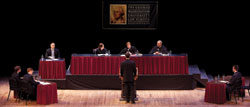 Jessica McConnell Burt
Jessica McConnell Burt
U.S. Supreme Court Associate Justice Elena Kagan anchored the bench for the final round of GW's 62nd annual Jacob Burns Van Vleck Constitutional Law Moot Court Competition.
Lisner Auditorium was transformed into a courtroom for the prestigious contest, as the Law School's top oral advocacy teams argued a fictitious case before a distinguished panel of justices composed of Justice Kagan, U.S. Court of Appeals for the 10th Circuit Judge Harris Hartz, and Florida Supreme Court Justice Barbara Pariente, JD '73.
Justice Kagan's appearance marked the fifth time in seven years that a U.S. Supreme Court justice has presided over GW's largest and longest-running advocacy contest. Chief Justice John G. Roberts Jr. and Associate Justice Sonia Sotomayor (prior to her appointment to the high court) judged the competition in 2006, followed by Associate Justice Samuel Alito in 2007 and Associate Justice Antonin Scalia in 2009.
"Supreme Court justices coming on campus to judge moot court competitions just isn't something that happens—ever—at most law schools," says David Johnson, assistant dean for public interest/public service law and director of advocacy programs. "GW, on the other hand, has been fortunate enough to have five members of the current Supreme Court participate since 2006."
Justice Kagan went "well above and beyond" and was "very, very gracious," Dean Johnson continues. "The night before, she met the dean, her fellow judges, and their families for dinner. Before the competition, she joined the faculty for lunch. During the competition, her questions were thoughtful and insightful. Afterwards, she posed for countless photos and signed autographs at the reception."
Arguments focused on a modern legal problem penned by last year's Van Vleck champions—Jonathan Maier and Sean Sherman. The case, Prentice v. Patel, centered on the constitutionality of a mock international treaty that banned burning or destroying religious artifacts outside of religious institutions during prayer hours. The petitioner's suit alleged that the treaty violated the First and 10th Amendments of the Constitution.
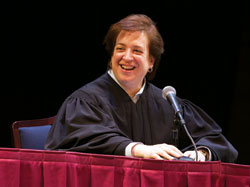 Jessica McConnell Burt
Jessica McConnell Burt
The four competitors—Tyler Evans and Matthew Radler for the petitioner and Devin Anderson and Samuel Cowin for the respondent—displayed professionalism, eloquence, and logic throughout the proceedings, skillfully tackling the battery of tough questions fired at them by the judges. In a split decision, the judges voted 2-1 in favor of the respondents.
"You were all marvelous," Justice Kagan told the competitors before announcing the winners. "Your briefs and your arguments were excellent. Your oral advocacy skills are very high. You were unflappable and poised. Congratulations to
all of you."
"The advocates today were just terrific," concurred Judge Hartz. "There are no losers. It is wonderful to be here to see the appellate stars of the future."
Commending the competitors for their "high levels of professionalism and preparation" and "superb advocacy," Judge Pariente said, "You became world experts on this case." The judge, who graduated fifth in her class at GW Law, also praised her alma mater, stating, "I have always been proud of the professionalism and high level of intellectual pursuit of this Law School."
Prior to revealing the final decision, the judges shared a few oral advocacy tips with the students. "The most important thing is to view questions as opportunities," Justice Kagan said. She also emphasized that briefs should be written in "crystal clear, smooth, easy-to-understand prose."
The Van Vleck championship was the culminating event of a five-month, multiple-round competition featuring 113 competitors—the second-largest group of participants in GW history. To earn a berth in the finals, the championship teams advanced through a series of preliminary, Sweet 16, quarterfinal, and semifinal rounds, logging hundreds of hours of brief writing, research, and oral argument practice along the way. The winning team members received the coveted Jacob Burns Award during commencement weekend.
"The Van Vleck competition was by far the most rewarding experience of my law school career," says winning team member Samuel Cowin, JD '12, a Highland Park, Ill., native, who is now clerking for Judge Anthony Epstein of the D.C. Superior Court. "I tried to soak in the whole experience, but it was a little difficult to do when a sitting Supreme Court justice was picking apart arguments I had spent months formulating!
"All of the judges were extremely gracious after the competition; they all took time to meet my family and provide feedback on my argument and brief. Devin and I even received handwritten notes from Justice Kagan a few weeks after the competition. The Van Vleck experience is certainly one I will never forget."
"The opportunity to argue in front of a Supreme Court justice is a rarity, even among the most seasoned advocates," adds winning team member Devin Anderson, JD '12, who is now clerking for Judge G. Murray Snow of the U.S. District Court for the District of Arizona. "To then have that chance as a law student was thrilling. Sam and I both put a lot of effort into both the written and oral components of the competition and to move through the competition, into the finals, and then emerge as champions was a tremendous honor."
—Jamie L. Freedman
GW Law Mourns the Loss of a Washington Legend
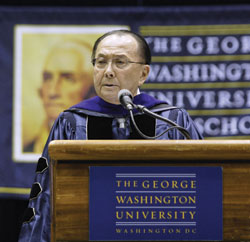
Sen. Daniel Inouye, JD ’52, who died Dec. 17, delivered the keynote commencement address to GW Law graduates in 2008.
GW Law bid a fond farewell in December to Sen. Daniel K. Inouye, JD ’52, the second longest-serving U.S. senator in history, who passed away Dec. 17 at the Walter Reed National Military Medical Center in Bethesda, Md. He was 88.
The first Japanese American elected to Congress, Sen. Inouye represented the people of Hawaii for more than 50 years. He was an instrumental figure in shaping U.S. defense policy and a tireless proponent of civil rights and fairness toward all Americans, helping to pass the Civil Rights Act of 1964, the Voting Rights Act of 1965, and the Americans with Disabilities Act of 1990.
Sen. Inouye chaired a number of committees, including the Senate Defense Appropriations Subcommittee—part of the Committee on Appropriations—and the Committee on Commerce, Science, and Transportation. He also served as the keynote speaker at the 1968 Democratic National Convention and on the Senate’s select committee on the Watergate scandal. In 2010, he was selected as president pro tempore of the Senate.
A highly decorated World War II veteran, Sen. Inouye joined the U.S. Army at age 17 after the attack on Pearl Harbor. He served with the famous “Go for Broke” U.S. Army regiment and received the Congressional Medal of Honor for his heroic actions after losing an arm while leading an assault in San Terenzo, Italy, on April 21, 1945.
Sen. Inouye graduated from the University of Hawaii in 1950 and GW Law School in 1952. In 1958, he was elected to Hawaii’s Territorial Senate, and became Hawaii’s first congressman in the U.S. House of Representatives in 1959, when Hawaii achieved statehood. He served almost nine consecutive terms in office.
Sen. Inouye remained actively involved with his alma mater during his time in Washington. In 1962, he received GW’s Distinguished Alumni Achievement Award, and he served as a member of the university's Board of Trustees from 1982 to 1992. Sen. Inouye delivered the keynote address at GW Law School’s 2008 Commencement, where he received an honorary Doctor of Laws degree from the university.
Christopher Bracey Takes the Helm as Academic Affairs Dean
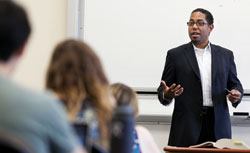
Senior Associate Dean of Academic Affairs Christopher Bracey talks with his students during his Constitutional Law II class this past spring.
Nick Gingold
A career in legal academia was originally not on the radar of Christopher Alan Bracey, GW Law's new senior associate dean of academic affairs. One of America's foremost experts on the intersections of race and the law, Associate Dean Bracey almost went to work in the aerospace industry.
He spent the last two summers of high school and the first two summers during his undergraduate studies at the University of North Carolina at Chapel Hill interning at Fairchild Space and Defense Corp. His duties included taking daily telemetry readings from satellites and conducting spaceflight hardware testing on the Hubble Space Telescope.
Fortunately for GW Law, his last year at UNC coincided with the end of the Cold War. As the hostilities between the former U.S.S.R. and the United States dried up, so did the funding for extensive aerospace projects. He saw the writing on the wall.
"I was looking for a career rather than a job," he says. "I had a science background, but I was also interested in history and the law. Getting a JD seemed to be the best way to follow my interests." He entered Harvard Law School in 1992, where he served as a supervising editor of the Harvard Law Review, a general editor of the Harvard Civil Rights – Civil Liberties Law Review, and an editor of the Harvard Blackletter Law Journal.
After earning his JD, he clerked for the Hon. Royce C. Lamberth of the U.S. District Court for the District of Columbia, who told him, "I know you're going to be a litigator, but you should also consider academia."
Next, he landed a job at Jenner and Block, where he had served as an intern his first year of law school. "Jenner and Block is not exactly a nuts-and-bolts litigation practice," he says. "It has a reputation as being a very cerebral sort of firm." At Jenner and Block, he served pro bono as co-counsel to the ACLU Foundation for the case Thompson v. HUD, which effectively ended public housing assignments based on racial discrimination and segregation. He also represented indigent minorities in the Washington, D.C., court system who were accused of drug offenses and facing significantly longer prison sentences due to the sentencing disparities between cocaine in powder form and cocaine in crack form.
"Victory was understandably more difficult to come by," he says. "The important thing, from my perspective, was the system was put to the appropriate test, that the government carried their burden, and that my client ultimately came to accept the process as fair and just."
Academia then beckoned, and after teaching at Northwestern University School of Law in Chicago and Washington University School of Law in St. Louis, he was offered a position at GW Law. As a native of the D.C. area, the decision to return home to teach was not a difficult one. "I liked the idea of raising my children in the nation's capital," he says.
At GW Law, he teaches Civil Procedure, Constitutional Law, and Race, Racism, and American Law, which has become his signature course. "I have been teaching Race, Racism, and American Law for 10 years, and it's become quite popular," he says. "It has elements of sociology, history, science, and, of course, how the legal system has dealt with race over the years.
"It remains interesting to students because the subject is never finished. The third section of the course involves the discussion of current events and controversies, and there are always current events and controversies that involve race. They never seem to end."
Associate Dean Bracey's expertise in race relations and the law in America have brought him to the attention of news outlets all over the country. His opinions and legal and cultural analysis have been sought on ABC, CBS, NBC, MSNBC, Fox News, CNN, and the BBC, among others. "I often get calls about cases involving celebrities that have a unique cultural or racial component to them," he says. "On cases that would involve a Michael Vick or a Michael Jackson, that's when my phone begins to ring."
He says that he is thoroughly enjoying his new role as senior associate dean of academic affairs. "We owe it to the students and to the Law School to make sure that our academic programs are as strong as they can be," he says. "But really, one of the best things about this position is that it gives me the opportunity to interact with and provide support to the rest of the faculty, and these are some of the sharpest legal minds in the country. I always find myself thinking, 'These guys are good.' "
—Adam Dawson
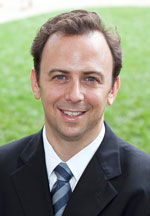 Obama Nominates F. Scott Kieff to ITC
Obama Nominates F. Scott Kieff to ITC
Congratulations go to Professor F. Scott Kieff, who was nominated by President Barack Obama in September to serve on the U.S. International Trade Commission pending Senate confirmation.
An expert on trade and intellectual property law, Professor Kieff joined GW Law in 2009.
"Scott is a leading figure in thinking about the relationship between intellectual property rights, trade, and entrepreneurship," says former Dean Paul Schiff Berman. "It's hard to imagine anyone more perfect for the commission."
Big Bad Wolf Trial Celebrates Fifth Anniversary
More than 300 fourth graders from Fairfax County Public Schools visited GW Law for the fifth annual Kids Mock Trial. At the popular event, run by Professor Jonathan Turley and a dedicated group of law students, the Big Bad Wolf goes on trial for crimes against the Pig family, providing elementary school kids with a close-up look at what it is like to be a juror and how police investigate and solve crimes.
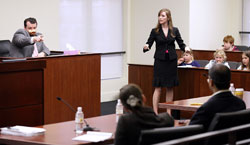
Prosecutor Catherine Allison, a 2L, asks witness and huffing-and-puffing victim Curly Pig, played by Timothy Weston, LLM '12, to point out his offender in court.
Abdul El-Tayef
|
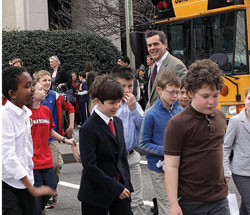
Professor Jonathan Turley welcomes the young participants to the trial, including one of his own four children, Aidan (center).
Abdul El-Tayef
|
A Perfect Combination
Fourth graders have endless questions and curiosity when it comes to police officers. That enthusiasm has drawn GW Police Captain Mark Balazik, BA '95, MA '04, to teach the law enforcement portion of Professor Jonathan Turley's annual Kids Mock Trial program for the past three years.
"There is a complete lack of hesitation to ask difficult questions," says Captain Balazik, who teaches forensics investigation and policing as part of the annual civics and legal education program.
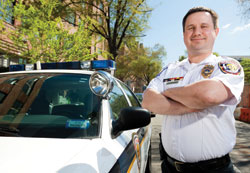
"Mark leaves the children enthralled with descriptions of how police investigate and prove crimes," says Professor Jonathan Turley. "His calm and friendly demeanor is an instant hit with the kids."
Abdul El-Tayef
Captain Balazik, who just entered his second year as a part-time JD student at GW Law, works full-time as the University Police Department's (UPD) inspector in charge of investigations and special operations. A UPD officer since 1996, the two-time GW alumnus moved to the Investigations Division in 2004 after earning a master's in criminal justice with a concentration in security management.
"Mark is quite familiar with certain aspects of the law," says UPD Chief of Police Kevin Hay. "He is very thorough. He's got a keen eye. He can recognize the cases that are important."
At GW Law, he plans to study criminal law with the goal of becoming a prosecutor with a state attorney's office. His law enforcement background is ideal for a prosecutor. When it comes to pursuing cases, "prosecutorial discretion is a beautiful thing," he says. "With my training and education, I will feel comfortable being the one making that decision."
So far, the biggest challenge he has faced as both a police officer and law student is time, or lack of it. It helps that he is married to another UPD employee, Erin Balazik, special assistant to the chief of police. The couple met in 2001. Her husband "does very well at managing his time," she says. "He's creative; he's even taken to blending fruit smoothies for breakfast."
"Mark has one of those wonderful combinations of intellect and experience that make for the best attorneys," says Professor Turley, his first-year torts professor, who created and oversees the Kids Mock Trial program. "In class, Mark's real-world experience as a police officer gives him a unique perspective. As one of the volunteers at our annual Kids Mock Trial event, he has become one of the main attractions for the children. His forensic lectures are now cited by many as their favorite part of the event."
—Bryan Koenig
Honoring Corinne Ball
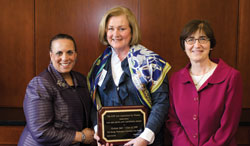
Corinne Ball, JD '78 (center), the recipient of this year's Belva Lockwood Award, with Associate Deans Renee DeVigne and Susan Karamanian
Chris Flynn
The George Washington Law Alumni Association and the Law Association for Women (LAW) recognized attorney Corinne Ball, JD '78, with the Belva Ann Lockwood Award, which celebrates the enduring legacy of women's rights. Ms. Ball is one of the country's premier bankruptcy and restructuring lawyers. She has led many notable cases, including representing Chrysler LLP in its successful Chapter 11 reorganization.
"I'm honored to be asked to join the ranks of some outstanding and successful women who were prior recipients of this award," Ms. Ball said.
Ms. Ball has received a number of prestigious awards over the years, including the Turnaround Management Association's International Turnaround Company of the Year Award and the Dealmaker of the Year by The American Lawyer. She was named one of the decade's most influential lawyers by The National Law Journal.
In 1873, women's rights champion and formidable legal mind Belva Ann Lockwood became the first woman to graduate from what is now GW Law. A trailblazer, she was one of the first women to run for president of the United States—before the 19th Amendment was passed—and the first woman to argue a case before the U.S. Supreme Court.
"We need to make our success as women known," Ms. Ball said. "Women are doing amazing things in this country, and they need to be recognized."
 GW Law Is #2 Most Downloaded on SSRN
GW Law Is #2 Most Downloaded on SSRN
GW Law faculty papers are some of the most sought-after publications in the legal world, according to recent rankings.
In July, the Social Sciences Research Network (SSRN)—an online depository for legal journal articles and research papers—announced a ranking of the most downloaded law school faculty papers. GW Law was the second-most downloaded law school, occupying this position in both the 12-month and all-time categories.
Papers and articles written by GW Law professors have been downloaded more than 75,000 times in the past year and more than 477,000 times since SSRN launched in 1994. Congratulations to our faculty for their outstanding and influential legal scholarship!
Magna Carta and the Constitution
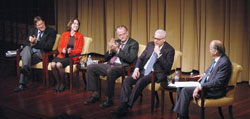
University of Texas Professor Zachary Elkins, GW Law Professor Renée Lettow Lerner, University of Virginia Professor Peter Onuf, Carlyle Group co-founder and attorney David M. Rubenstein, and University of Virginia Law Professor A.E. Dick Howard participated in a panel about Magna Carta at the National Archives.
Claire Duggan
To celebrate the return of Magna Carta, 1297—widely viewed as one of the most important legal documents in the history of democracy—to the National Archives this year, the Smithsonian presented a panel on the document's connection to the American Constitution.
GW Law Professor Renée Lettow Lerner joined history and legal experts for a discussion on topics including Magna Carta's place in the charters of the American Colonies, its impact on the era of the Founding Fathers, and its legacy in the context of world constitutionalism.
Private equity trailblazer, attorney, and philanthropist David Rubenstein is responsible for Magna Carta being on this side of the pond and available for Americans and other visitors to view and learn from at the National Archives. Mr. Rubenstein both purchased the last privately held copy of the document and donated the funds for a new gallery and visitors' center to house the document.
Student Scholarship Soaring
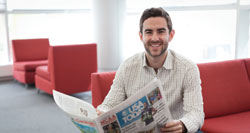
GW Law student Drew F. Cohen's editorial on Citizens United and corporate disclosure of super PAC contributions appeared in USA Today.
Nick Gingold
GW Law students are getting a jump start on the publications world, contributing to legal dialogues and debates through their published works. Here are a few students whose papers, editorials, and book chapters are attracting national attention:
Drew F. Cohen: Corporate Disclosure of Super PAC Contributions
GW Law student Drew F. Cohen published an editorial on Citizens United and corporate disclosure of super PAC contributions in USA Today in March. Mr. Cohen is a joint-degree student with the School of Business, as well as a GW undergrad-uate alumnus.
"Although shareholders can protest political messages by selling their stock, firms usually disclose their contributions, if at all, after they have already donated them," he wrote in the editorial. "Shareholders are thus stuck, without recourse, prospectively footing the bill.
"To counter these risks, the Securities and Exchange Commission should implement rules to promote disclosure and transparency of corporate political spending, enabling shareholders to act as an effective check. Specifically, the agency should require companies to include political positions and contributions in their annual reports, disclose any anticipated political spending, and describe how political campaign contributions fit the company's overall mission."
Click here to read the op-ed.
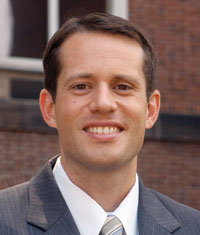
An article that Justin T. Golart, JD '12, wrote for his state and local taxation class was published in the influential State Tax Notes in July.
Claire Duggan
Justin T. Golart: Corporate Tax Incentives and the Equal Protection Clause
Justin T. Golart, JD '12, published an article in the influential State Tax Notes in July analyzing corporate tax incentives under the Citizens United holding.
"Corporate tax incentives may not be as legally sound as their prevalence suggests," he wrote. "They could be viewed as a violation of the Equal Protection Clause... As the legal system continues to view corporations as distinct legal persons, it seems that corporations have less ground to stand on when seeking to justify the preferential treatment they receive." To read the full article, please visit http://taxprof.typepad.com/files/65st0033.pdf
The paper was written for Professorial Lecturer in Law David E. Brunori's state and local taxation class this past spring. "Having my article published in State Tax Notes is a true honor," says Mr. Golart. "It is very humbling, and State Tax Notes would never have seen my article without the support of Professor Brunori—he went the extra mile on my behalf, and I'll always appreciate that he did so."
Mr. Golart will spend the next two years working for the U.S. Federal Bureau of Prisons' Office of the General Counsel as a Department of Justice Attorney General's Honors Program Fellow.
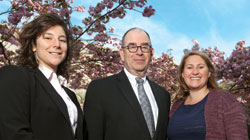
Jennifer Bowmar, environmental law fellow and LLM student (right), and 2L Lea Colasuonno (left) have each co-authored book chapters with Associate Dean Lee Paddock that will be published this year.
Nick Gingold
Students Co-Author Chapters in Environmental Law Books
Jennifer Bowmar, environmental law fellow and LLM student, and 2L Lea Colasuonno have co-authored the following book chapters with Associate Dean Lee Paddock that will be published this year:
• "The U.S. National Environmental Policy Act at 40: Progress and Challenges" (Paddock and Bowmar), in 30th Anniversary of the Brazilian National Environmental Policy Act.
• "Multi-Layered Environmental Governance in the United States" (Paddock and Bowmar) and "Water Management and Protection in the USA" (Paddock and Colasuonno), in the forthcoming book Environmental Protection in Multi-Layered Systems: Comparative Lessons from the Water Sector.
Dean Paddock also co-authored a book chapter with 2011 LLM graduate Charlotte Youngblood: "Demand Response and Infrastructure Development in the United States" to be published in the forthcoming book Energy Networks and the Law—Innovative Solutions in Changing Markets.
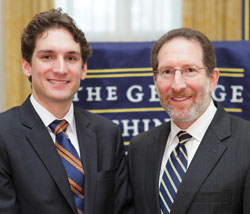
When Collin Swan, JD '12 (left), was a 2L, he and Professor Steve Schooner (right) co-authored "Dead Contractors: The Un-Examined Effect of Surrogates on the Public's Casualty Sensitivity," which was published in the Journal of National Security Law & Policy and quoted in the media.
Abdul El-Tayef
Government Contracts Student Wins Two Awards for Papers
Collin Swan, JD '12, won two prestigious writing competitions this year in the area of government procurement law. His paper on the evolving reality of personal services contractors took top honors in a writing competition conducted by the Section of Public Contract Law of the American Bar Association. He presented a talk on his paper to the section's Federal Procurement Institute in Annapolis, Md., in March.
Later in the spring, Mr. Swan's paper "Synchronized Pre-Deployment and Operational Tracker"—a centralized interagency database used by the federal government to monitor military contractors—won a writing competition conducted by the National Contract Management Association. He made a presentation on that paper at the NCMA's World Congress in Boston in July.
Nation's Best Advocates: 40 Lawyers Under 40
GW Law alumni were well represented on the National Bar Association's and IMPACT's 2012 list of Nation's Best Advocates: 40 Lawyers Under 40. This year's honorees included Erek Barron, JD '99, Tremayne Bunaugh, JD '01, Rodney Pratt, JD '01, and Annamaria Steward-Dymond, JD '99.
The National Bar Association (NBA) is the world's largest and oldest organization of attorneys of color, and IMPACT is a D.C.-based civic engagement organization. The partnership between the two has been recognizing the top 40 African-American lawyers under the age of 40 for the past three years. This year's honorees were recognized July 15 at the NBA's 87th Annual Convention in Las Vegas at Caesars Palace.
According to Mr. Pratt, an assistant general counsel for NIKE Inc., the recognition is an important accomplishment at this stage of his career. "It is encouraging to know I am putting to good use the skills and community commitment I learned at GW," he said.
Each of the honorees credits GW Law as being a major influence on his or her legal career and success.
Mr. Barron, counsel at Whiteford, Taylor & Preston LLP, said that four students out of 40 nominees coming from GW Law "says a lot for the strength of our school."
Ms. Steward-Dymond, associate dean of students at the University of the District of Columbia's David A. Clarke School of Law, echoed Mr. Barron's sentiments.
"The fact that 10 percent of the Top 40 Under 40 awardees are George Washington University Law School graduates is a testament to the skills, drive, and commitment to service that the school instills in us," she said.
Other law schools also had multiple honorees, but according to Will Wilder, JD '06, a member of the NBA's host committee, four nominees is "on the high side."
To win, according to Associate Dean for Trial Advocacy Alfreda Robinson, JD '78, "you have to basically be a superstar. These are young lawyers who are at the top of the profession."
The honorees each attribute a great deal of their success to their involvement in the Law School's Black Law Student Association (BLSA), which maintains close ties between alumni and works to instill a sense of community service. "Alumni will tell you that they have very close ties to BLSA," said Associate Dean Robinson, an adviser of the organization.
Mr. Bunaugh, counsel to the U.S. Senate Select Committee on Ethics, has dedicated time to mentoring students through BLSA, assisting with résumés, cover letters, and general guidance. "Ultimately I knew this was an obligation of mine," he said.
This is not GW Law's first year to have multiple 40 Lawyers Under 40 honorees. Last year saw three alumnae honored among the Top 40: Andrea Hence Evans, JD '02, who took home the honor of Nation's Best Advocate for the year, Kimberly Reddick, JD '96, and Angelia Wade, JD '02.
—Bryan Koenig
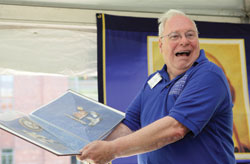
Departing Dean Morrison was showered with retirement gifts, including a book of remembrances of his career.
Abdul El-Tayef
Farewell, Dean Morrison
GW Law bid a fond farewell to Senior Associate Dean for Administrative Affairs Thomas A. Morrison, LLM '83, in June at a communitywide barbecue and celebration in his honor.
The popular dean, who earned an LLM in environmental law at GW, received the prestigious Jacob Burns Award for Extraordinary Service in recognition of his 14 years of contributions to the Law School's civic and academic mission.
A veteran of the United States Navy, Dean Morrison worked as an attorney and legal management expert in the Navy's Judge Advocate General's Corps for 28 years prior to joining GW.
During the celebration, Dean Morrison was also presented with a number of mementos from the Law School, including a book of remembrances of his career, an artist's rendering of the Law School, and a brick bearing his name that was later laid in the exact center of the University Yard walkways.
Former Dean Paul Schiff Berman credited Dean Morrison with shaping the physical appearance of GW Law during a tenure that began in 1998 and included a dramatic renovation of the Law School facilities. "To see his legacy," he said, "just look at these buildings."
The legacy Dean Morrison leaves behind is not just one of physical buildings but also of a profound impact on the system and people of GW Law, former Dean Berman said. The school "will be forever better because of Tom," he said.
Dean Morrison expressed his deep gratitude to the Law School faculty and staff as well as the larger GW community and contractors and vendors with whom he has worked over the years.
"I found a second home at GW," Dean Morrison said. Later, on his retirement, he said, "I'm going to chase more dreams."
—Bryan Koenig
Gender Equality in the Workplace
GW Law Team Plays Key Role in Report
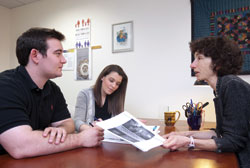
John Theodore Fey Research Professor of Law Naomi Cahn (right) and students Michael Peters, JD '12, and 2L Lindsay Luken collected and analyzed data for the report on gender equality.
Nick Gingold
A new report on workplace gender equality in the United States and Switzerland reveals women in both countries face similar challenges, including a gender wage gap.
Gender Equality in Employment: Policy and Practices in Switzerland and the United States, released by GW, features survey responses from more than 1,100 male and female professionals in Switzerland. Data for the United States were collected from a variety of sources, including the U.S. Bureau of Labor Statistics. The report was conducted with support from the U.S. Embassy in Bern, Switzerland.
The GW research team that prepared the report included Michelle Kelso, assistant professor of sociology and international affairs; Naomi Cahn, John Theodore Fey Research Professor of Law; and Barbara Miller, associate dean for faculty affairs and professor of anthropology in the Elliott School of International Affairs. GW Law students Michael Peters, JD '12, and 2L Lindsay Luken assisted Professor Cahn.
"Mike and Lindsay provided superb research assistance, and authored or co-authored important parts of the report," says Professor Cahn. "They were able to draw on material they had studied in their GW courses, and they then expanded that base knowledge into new areas relating to business law, employment discrimination, family law, and federal policy."
The report includes their research on gender certification, successful child care structures, part-time and flexible work schedules, quotas, and mentoring. For more information and to read the report, visit the website of the U.S. Embassy in Bern.
Faculty on the Hill
GW Law Professors Testify Before Senate and House
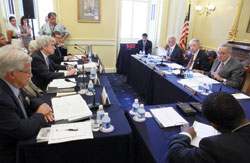
GW Law Professor Edward T. Swaine (left table, center) testified before the Senate Judiciary Committee in June on Holocaust-era claims.
Rick Reinhard
GW Law professors are a fixture on Capitol Hill, appearing frequently as expert witnesses at U.S. Senate and House hearings on a variety of important issues.
Professor Edward T. Swaine served as an expert at a Senate Judiciary hearing in June on Holocaust-era claims in the 21st century.
Professor Swaine was asked by Senator Charles E. Schumer (D-N.Y.) and Senator Charles Grassley (R-Iowa) to testify before the Senate Judiciary Committee on the international law implications of a bill that would make liable European railroads that participated in Holocaust deportations during the 1940s. The problem centers on the fact that suits against some of them, including the French national railroad, have been dismissed on sovereign immunity grounds based on existing U.S. law.
He described the constraints that international law placed on U.S. reform efforts, and suggested approaches that might provide for reparations without raising international objections or undermining the rule of law.
"I was honored and moved to testify alongside Holocaust survivors and others who have advocated on their behalf," said Professor Swaine. "The statements and questioning by Judiciary Committee members and other bill sponsors suggest that they are actively engaged with the issue and wrestling with the difficult legal and policy questions it poses. I'm glad to have had the chance to participate in the process."
Also in June, Professor Richard J. Pierce Jr. participated in a House Ways and Means Committee's hearing, "Securing the Future of the Social Security Disability Insurance Program." Professor Pierce, a preeminent expert in administrative law, has researched and written extensively on the topic of disability decision making by the Social Security Administration and discussed his concerns about problems and concerns with the Social Security Subcommittee.
In other news, Constitutional law expert Professor Jonathan Turley testified before the House Committee on the Judiciary as an expert on executive overreach: the president's unprecedented recess appointments.
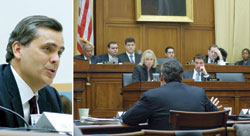
Professor Jonathan Turley gave his expert opinion on recess appointments to the House Judiciary Committee.
Claire Duggan
|
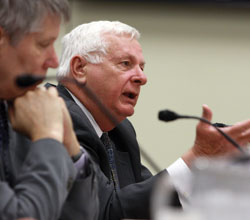
Professor Richard J. Pierce Jr. discussed the future of the Social Security disability insurance program at a House Ways and Means Committee hearing in June.
Rick Reinhard
|
Justice Thomas' Day Off
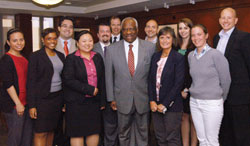 Claire Duggan
Claire Duggan
U.S. Supreme Court Justice Clarence Thomas thoroughly enjoyed and missed teaching his weekly constitutional law seminar at GW, he told Professor Gregory Maggs' Con Law I students last spring. "So I'm off today and thought I would come to school."
After the class, LLM students in the National Security and U.S. Foreign Relations Program enjoyed lunch and conversation with the justice. In the fall, the justice and his former clerk, Professor Maggs, once again co-taught their constitutional law seminar.
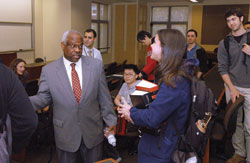
Claire Duggan
|
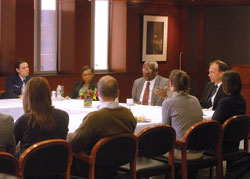
Claire Duggan
|
Business, Law Schools Launch Government Contracts Degree Program
George Washington University has launched a new master's program that combines a core business curriculum with the study of government procurement law—or the rules controlling how the federal government contracts with private parties and monitors the performance of its contracts.
The Master of Science in Government Contracts degree is geared toward working professionals in both the public and private sectors, and is meant to give them the knowledge and skills they need to work in a position related to federal acquisition. The program is one of few of its kind in the world.
"In a society as law based as the United States, legal education can no longer be confined only to those who plan to be lawyers," says former GW Law Dean Paul Schiff Berman. "The Master of Science in Government Contracts degree explodes the model by allowing government and business professionals to access at GW both the nation's leading government procurement law program and the outstanding core business curriculum. Together this combination literally transforms the educational landscape in this large and diverse field that is crucial to the nation's economy."
GW School of Business Dean Doug Guthrie calls the degree a "natural fit" for the university—and one that students will greatly benefit from.
"Our new interdisciplinary degree is a great opportunity for rising business executives to gain expertise from the Law School's already established government procurement program, while becoming familiar with the business principles behind government contracting," Dr. Guthrie says.
The GW Law School has been a leader in government contracts and procurement law for more than 50 years, says Law School Associate Dean for Government Procurement Law Daniel Gordon.
"With this innovative new program, and through our collaboration with the GW School of Business, we look forward to making our outstanding procurement law program and faculty available to business professionals from all segments of the federal acquisition arena," Associate Dean Gordon says.
Oral Advocacy Roundup
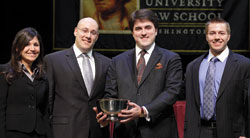
(left to right) Samantha Steinberg, Jake Chervinsky, William Cooper (holding trophy), and Joseph Kaufman celebrate their victory in the Georgetown Law White Collar Crime Mock Trial Competition.
It was another banner year for GW Law in the oral advocacy arena, with GW students taking top honors in a number of competitions across the nation and around the globe. The Law School once again ranked among the top moot court programs in the nation for 2011-12, finishing at No. 11 in the University of Houston Law Center's annual rankings and earning a berth for the third straight year at the Moot Court National Championship Competition in Houston in January 2013.
Here's how GW competitors fared in major advocacy contests in 2011-12:
Graham Van Leuven and Jonathan Pitel won Best Team at the UCLA Cybercrimes Moot Court, and Mr. Van Leuven was selected Best Oralist and Best Brief Writer. The team was coached by GW cyberlaw expert Orin Kerr, with a little help from Anne Olesen and David Johnson.
William Cooper, Samantha Steinberg, Jake Chervinsky, and Joseph Kaufman won the Georgetown Law White Collar Crime Mock Trial Invitational Competition. They came in first of 20 teams, beating Northwestern in the semifinals and Fordham in the finals. 2L Jake Chervinsky was singled out with an attorney award. The team was coached by Mark Shaffer. As a result of this victory, GW was invited to participate in the 2012 National Criminal Justice Trial Advocacy Competition in Chicago in March.

(left to right) Ariel Gould, Joseph Yarbough, Meredith Dempsey, James Bonneau, and Christen Gallagher (alternate) won the ABA Section on Labor and Employment Law's Eighth Annual Law Student Trial Advocacy Regional Competition.
Meredith Dempsey, Joseph Yarbough, Ariel Gould, and James Bonneau won the ABA Section on Labor and Employment Law's eighth annual Law Student Trial Advocacy Regional Competition in Washington, D.C. They were led by our newest coach, Moses Cook of DC Law Students in Court. They beat out a field of 18 teams, defeating teams from Penn, UVa, and William & Mary, and advanced to the National Tournament in Miami last January.
Elizabeth Saxe and Puja Bhatia won Best Oral Advocate and Second Best Oral Advocate, respectively, at the K.K. Luthra Memorial Moot Court at the University of Delhi in India in January. The awards, presented at the conclusion of the competition, were particularly fitting because the moot opened with a Workshop on Success in Advocacy Competitions presented by GW Law. Shauna Johnston, a 3L and winner of last year's Luthra Competition, spoke about how to succeed in the Luthra Moot, while Assistant Dean David Johnson discussed the fundamentals of success in all advocacy competitions.
Joshua Parker, Dan Bumpus, and Dennis Holmes won the prize for Best Brief and made it to the final round of arguments in Catholic University's National Telecommunications Moot Court competition. They were coached by Adjunct Professor Natalie Roisman, who teaches telecommunications law.
Taylor King and Anna Smith tied for Best Appellant Brief in the Giles Rich Intellectual Property Regional Moot Court in Silicon Valley, Calif. Along with the team of Gwen Tawresey and Philip Harris, they advanced to the semifinals of the competition. They were coached by John Whealan, associate dean for intellectual property law studies.
Tayyaba Waqar was awarded the Best Petitioner's Brief in the Legal Action Network for Development Strategies (LANDS) Legal Writing Competition and Moot Court.
Joe Kaufman and Jake Chervinsky advanced to the finals of the Texas Young Lawyers Association's National Trial Competition. They were coached by SJD candidate Magin Puig. GW hosted the competition under the direction of the Mock Trial Board, particularly Meredith Dempsey and Ryan O'Conner.
Julia Jarret, Patrick DePoy, Matt Vogel, and Matt Roberson finished second as finalists in the American Association for Justice Mock Trial Competition, which took place in D.C. Sidney Rocke, a recent addition to GW Law's adjunct professor ranks, was their coach.
Rachel Heflin, Jessica Russo, and Patrick Rigney finished second in the Manfred Lachs Space Law Moot Court North American Competition. The team was coached by alumnus Henry Hertzfeld, research professor at the Elliott School of International Affairs Space Policy Institute and adjunct professor at GW Law.
Allison Hellreich and Kimberly Ferguson reached the finals of the Harold H. Greene & Joyce Hens Green National Security Law Moot Court Competition. They were coached by Adjunct Professor Steven Cash.
Portia‑Elaine Gant and DeMaris Trapp advanced to the finals of the ABA First Amendment & Media Law Diversity Moot Court in Orlando, Fla. They were coached by Mike Selmi and Orin Kerr.
Bethany Young and Erik Siverston reached the semifinals of the Stetson International Environmental North American Atlantic Regional Moot Court Competition at American University.
Carrie Rose Wilkinson placed second in the Legislative Drafting and Lobbying Competition at the National Animal Law Competitions, hosted by the Center for Animal Law Studies and held at UCLA. She was coached by alum Lynn Deavers.
Christy Milliken won Second Best Oralist and Sam Stone was Fourth Best in the Gujarat National Law University International Moot Court Competition in India. Thirty‑eight teams from all over India and the world participated.
Emily Walters and Nicole Josko reached the semifinals of the Religious Freedom Moot Court. They were coached by alum Melissa Colangelo.
Stephanie Trifone and Ashley Garcia made it to the semifinals of the Client Counseling External Competition at Villanova. After an excellent first‑round performance, they were the top‑scoring team. They were coached by alumna Emily Harlan.
Robert Travieso, James Mieding and Thomas Felix (brief writer) represented GW Law in the Andrews Kurth Moot Court National Championship at the University of Houston Law School in January. They won third Best Brief, advanced to the quarterfinals, and James Mieding was selected third Best Oralist. They were coached by Eric Klein, who won Van Vleck several years ago.
Lisa Lederberger and Matthew Bornfreund reached the quarterfinals of the Frankfurt International Investment Arbitration Competition. The GW team was the only American team that made it to the quarter-finals, where it lost to Versailles. The team was coached by Luisa Torres and Jonathan Gimblett, both of Covington & Burling.
Tamara Evans, Kate Nunley, and Iris Lowery made it to the quarterfinals of the Pace Environmental Moot Court Competition. Professor Robert Glicksman and Deans Lee Paddock and Robin Juni coached the team.
Kristine Hsu, Drake Morgan, Dustin Pusch, Melissa Sampson, and Vincent Weisband won the sixth Best Memorial in the Jessup International Law Moot Court Competition. They were coached by Susan Karamanian, associate dean for international and comparative legal studies.
Weighing In on the Health Care Debate
GW Law Faculty Offer Health Law and Policy Expertise on Historic Supreme Court Case
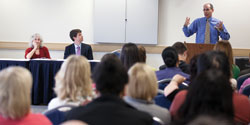
GW Law Professor Peter Smith (right) and School of Public Health Professor and GW Law Professor by Courtesy Sara Rosenbaum (left) offered insight and analysis on the future of national health reform during the round table.
Jessica McConnell Burt
In a spring roundtable discussion with health care law and policy experts, five GW professors from across the disciplines examined the complicated issues surrounding the historic U.S. Supreme Court case challenging the constitutionality of the Patient Protection and Affordable Care Act.
In the two years since President Obama signed the bill into law, GW Law faculty have been at the forefront of scholarship on the topic, analyzing the many implications of the bill and providing law students with a real-world tutorial on health care issues and the interdisciplinary nature of the law.
In March during the oral arguments and in June when the ruling was announced, GW Law Professors Neil Buchanan, Jeffrey Rosen, Sara Rosenbaum, Orin Kerr, Jonathan Turley, Alan Morrison, and John Banzhaf were interviewed for more than 40 media pieces by outlets including NPR, The Washington Post, Huffington Post, PBS NewsHour, MSNBC, The Washington Times, TIME, Bloomberg, C-SPAN, The National Law Journal, WTOP radio, and more. Click here to read about their analysis of the legal issues behind the ACA and the holding's potential impact on people and states.
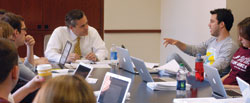
Playing the roles of the justices, students in Professor Jonathan Turley's Constitutional Law Seminar discuss the health law case while oral arguments were under way at the U.S. Supreme Court.
Claire Duggan
Michael Carvin, JD '82, was one of the main attorneys making oral arguments before the U.S. Supreme Court in the case challenging the Obama administration's sweeping reform of the U.S. health care system. A partner at Jones Day, Mr. Carvin represented the National Federation of Independent Business in challenging the health care reform law. He has five prior Supreme Court appearances and argued before the Florida Supreme Court on behalf of George W. Bush in the 2000 legal battle over the vote recount in that state.
Distinguished Speaker Series Inaugural Year Recap
Global Internet Freedom, Human Rights Featured
Professor Dawn Nunziato and Professor Arturo Carrillo last year brought to GW Law an engaging lecture series featuring prominent free speech and human rights experts.
The Global Internet Freedom and Human Rights Distinguished Speaker Series featured five events addressing these important issues and providing students and practitioners with a chance to participate in timely discussions. The speaker series is presented through the generous support of Microsoft and is also publicized on the Technology/Academics/Policy (TAP) website.
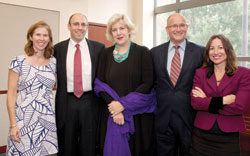 Former
Dean Paul Schiff Berman (second from left) speaks with lecturer Dunja Mijatovi, Professor Arturo Carrillo, and Professor Dawn Nunziato during the first event of the speaker series.
Former
Dean Paul Schiff Berman (second from left) speaks with lecturer Dunja Mijatovi, Professor Arturo Carrillo, and Professor Dawn Nunziato during the first event of the speaker series.
Jessica McConnell Burt
Freedom of the Media
The speaker series kicked off at the Law School with Dunja Mijatovi, representative on freedom of the media at the Organization for Security and Co-Operation in Europe. An expert in media law and regulation, she previously served as chairperson of the European Platform of Regulatory Authorities, the world's largest network of media regulators. She is co-founder of the Communications Regulatory Agency of Bosnia and Herzegovina, established in 1998. In that role, Ms. Mijatović encouraged a legal and policy framework for media in the post-war society. She is a graduate of the University of Sarajevo, the University of Bologna, and the London School of Economics.
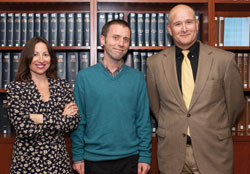
The audience engaged in a lively Q&A session with Ian Brown (center), senior research fellow at the Oxford Internet Institute, at the close of the presentation.
Internet Freedom: A Comparative Assessment
In another series highlight, Ian Brown, senior research fellow at the Oxford Internet Institute, spoke to students, practitioners, and faculty about internet freedom through the lenses of various nations and their laws.
Dr. Brown has served as a trustee of Privacy International, the Open Rights Group, and the Foundation for Information Policy Research. He has also served as an adviser to Greenpeace, the Refugee Children's Consortium, Amnesty International, and Creative Commons UK. In 2004, he was voted one of the 100 most influential people in the development of the Internet in the United Kingdom during the previous decade.
The Right to Freedom of Opinion and Expression
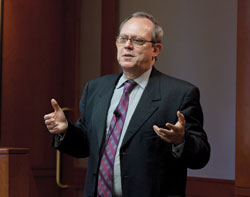
Nobel Peace Prize nominee Frank La Rue of the United Nations spoke about the right to freedom of opinion and expression.
Jessica McConnell Burt
The speaker series welcomed Frank La Rue, special rapporteur on the promotion and protection of the right to freedom of opinion and expression at the United Nations. The U.N. Human Rights Council, which appointed him to the post of special rapporteur in March 2008, recently renewed his mandate until 2014.
Mr. La Rue has been involved in the promotion of human rights for 25 years. He is the founder and president of the Center for Legal Action for Human Rights (CALDH) in his native Guatemala—a renowned NGO that has brought pioneering human rights cases to Guatemalan courts as well as to the Inter-American Human Rights System. He has also held a number of other important posts, serving as presidential commissioner for human rights in Guatemala, human rights adviser to the minister of foreign affairs, and president of the governing board of the Centro-American Institute of Social Democracy Studies. In 2004, he was nominated for the Nobel Peace Prize.
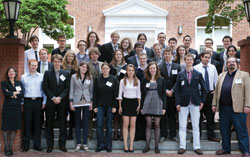
Panelists, professors, and students from the University of Groningen and GW Law gathered for a group photo after
the conference.
Nick Gingold
Transatlantic Global Online Freedom
The series wrapped up its first year with a conference jointly hosted by the George Washington University Law School and the University of Groningen in the Netherlands.
The conference, titled Transatlantic Global Online Freedom and Corporate Responsibility, examined how the Internet has become the most important medium for worldwide communication and trade, while offering unprecedented possibilities for censorship, monitoring, and surveillance by authoritarian regimes. Western companies that supply information technology to such regimes facilitate this censorship, whether intentionally or unintentionally.
Consent of the Networked
GW Law and the Microsoft Policy & Innovation Center hosted journalist and activist Rebecca MacKinnon for a talk on the intersection of the Internet, human rights, and foreign policy.
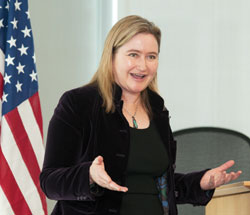
Journalist and activist Rebecca MacKinnon spoke about the intersection of the Internet, human rights, and foreign policy.
Co-founder of Global Voices Online and the Bernard L. Schwartz Senior Fellow at the New America Foundation, Ms. MacKinnon's work examines U.S. policies related to the Internet and human rights. Her first book, Consent of the Networked: the Worldwide Struggle for Internet Freedom, was published this year by Basic Books.
In addition to co-founding Global Voices Online, a global citizen media network, she is a founding member of the Global Network Initiative, a multistakeholder initiative to advance principles of freedom of expression and privacy in the information and communications technology sector. Ms. MacKinnon worked as a journalist for CNN in Beijing for nine years, serving as Beijing bureau chief and correspondent, and later as CNN's Tokyo bureau chief and correspondent.
Moroccan Supreme Court Judges Visit GW Law
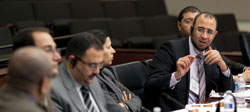
A delegation of Moroccan Supreme Court judges visited GW Law for a day of discussions about the U.S. judicial system and rule of law.
Nick Gingold
Members of the Moroccan Supreme Court and Moroccan Attorney General's Office visited GW Law this spring to learn about the U.S. courts and judicial system. Associate Dean Alfreda Robinson and Professorial Lecturer in Law Zol Rainey presented a lecture to the high-level delegation, which was invited to GW Law by the U.S. State Department's Bureau of Educational and Cultural Affairs.
During their visit, the four participants—three magistrates and a general attorney of Morocco's highest court—engaged with Dean Robinson and Professor Rainey in discussions on topics including U.S. federal, state, and local judicial systems, judicial reform, promoting the rule of law, and trial processes and court procedures.
The lessons and discussions are particularly important in the wake of the Arab Spring. Morocco has adopted a new constitution, and there is a strong interest at the most senior level of the Moroccan judiciary in reforming the operations of the justice system by drawing on the expertise of other non-civil law countries.
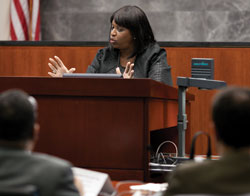
Associate Dean Alfreda Robinson
Nick Gingold
|
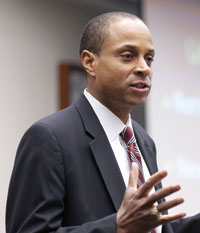
Professor Zol Rainey
Nick Gingold
|
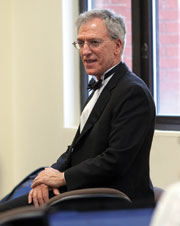 Nick Gingold
Nick Gingold
Daniel Gordon Earns Slot in "Federal 100"
Associate Dean Daniel I. Gordon was recognized as one of Federal Computer Week's "Federal 100"—the top executives from government, industry, and academia who made the greatest impact on the government information systems community in 2011. Associate Dean Gordon received his award at an evening gala, but not before teaching his comparative public procurement class.
Champions and Visionaries
Former Dean Paul Schiff Berman and three GW Law alumni are “champions and visionaries” of the law, according to the The National Law Journal’s and Legal Times’ fifth-annual “Champions & Visionaries” list. The coveted award recognizes lawyers who have helped advance the practice of law in Washington.
Joining the former dean on the list of “champions” are Carolyn Osolinik, JD ‘77, a partner at Mayer Brown, and Patrick McGlone, JD ’86, senior vice president and general counsel of Ullico Inc. Michael McKeon, JD ’96, a principal at Fish & Richardson, was lauded as a “visionary” of the law.
Spanogle Finalists to Represent GW at Prestigious International Competition
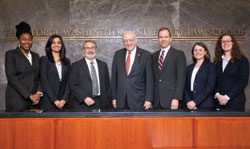
Winners Anika Patterson and Priyam Bhargava (left) and runners-up Jacqueline Powers and Elizabeth Dalmut flank the Spanogle Finals judges Mark Kantor, chair of the D.C. Bar International Dispute Resolution Committee, and Professors John Andrew Spanogle Jr. and Gregory Maggs.
Nick Gingold
This spring, GW Law students tested their oral and written advocacy skills in the annual Pamela Spanogle International Arbitration Competition.
Finalists Anika Patterson and Priyam Bhargava, representing the claimant, and Jacqueline Powers and Elizabeth Dalmut, representing the respondent, presented arguments before a tribunal made up of Professor John Andrew Spanogle Jr., Professor Gregory Maggs, and Chair of the D.C. Bar International Dispute Resolution Committee Mark Kantor.
Ms. Patterson and Ms. Bhargava won this year's Spanogle Competition and will compete in next spring's 2013 Willem C. Vis International Commercial Arbitration Competition. Their stellar scores over the past academic year also qualified runners-up Ms. Powers and Ms. Dalmut to compete in the prestigious international ADR competition.
"The arbitration problem was extremely realistic," says Professor Maggs. "It was a delight to see the competitors handle the issues. Their thorough preparation was quite apparent. Both sides did very well."
"The Pamela Spanogle International Arbitration Competition was both challenging and incredibly rewarding," says Ms. Patterson. "So many businesses operate on a global scale; therefore, gaining experience in the resolution of commercial disputes is invaluable. The Pamela Spanogle International Arbitration Competition has been one of the best experiences I've had in law school."
"This is another example of the great opportunities at GW Law," says Assistant Dean and Director of Advocacy Programs David M. Johnson. "Professor Andy Spanogle not only devotes his time to students interested in international arbitration competitions, but also helps fund four students each year to travel to Hong Kong or Vienna to compete in the Vis Competition.
"Professor Spanogle's efforts have also helped create this on-campus competition, which went from the smallest of all our competitions a few short years ago to the second largest this past spring. The process resulted in the selection of four truly excellent students to represent GW in the Vis Competition next year. I am certain that they will learn much, represent the school well, and have a great time."
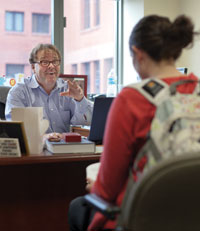
Professor Lawrence A. Cunningham's new book, Contracts in the Real World, features stories about popular contracts and why they matter.
Nick Gingold
Contracts in the Real World
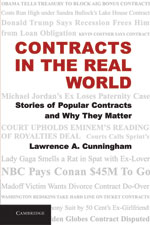 Contracts, the foundation of economic activity, are both vital and misunderstood. Professor Lawrence A. Cunningham's latest book corrects some of these misunderstandings through a series of engaging stories involving such diverse individuals as Martin Luther King, Maya Angelou, Clive Cussler, Lady Gaga, and Donald Trump.
Contracts, the foundation of economic activity, are both vital and misunderstood. Professor Lawrence A. Cunningham's latest book corrects some of these misunderstandings through a series of engaging stories involving such diverse individuals as Martin Luther King, Maya Angelou, Clive Cussler, Lady Gaga, and Donald Trump.
Capturing the essentials of the subject, Contracts in the Real World explores recurring issues people face in contracting. The book, which appeals to general readers and specialists in the field alike, shows how age-old precedents and wisdom still apply today and how contract law's inherent dynamism cautions against exuberant reforms.
Professor Cunningham hosted a reading and book signing at a salon event at Benjamin Cardoza Law School in New York this June. Stay tuned for more book events this fall and become a fan on Facebook.
 Jessica McConnell Burt
Jessica McConnell Burt



 Obama Nominates F. Scott Kieff to ITC
Obama Nominates F. Scott Kieff to ITC



 GW Law Is #2 Most Downloaded on SSRN
GW Law Is #2 Most Downloaded on SSRN 
















 Former
Dean Paul Schiff Berman (second from left) speaks with lecturer Dunja Mijatovi, Professor Arturo Carrillo, and Professor Dawn Nunziato during the first event of the speaker series.
Former
Dean Paul Schiff Berman (second from left) speaks with lecturer Dunja Mijatovi, Professor Arturo Carrillo, and Professor Dawn Nunziato during the first event of the speaker series.









 Contracts, the foundation of economic activity, are both vital and misunderstood. Professor Lawrence A. Cunningham's latest book corrects some of these misunderstandings through a series of engaging stories involving such diverse individuals as Martin Luther King, Maya Angelou, Clive Cussler, Lady Gaga, and Donald Trump.
Contracts, the foundation of economic activity, are both vital and misunderstood. Professor Lawrence A. Cunningham's latest book corrects some of these misunderstandings through a series of engaging stories involving such diverse individuals as Martin Luther King, Maya Angelou, Clive Cussler, Lady Gaga, and Donald Trump.